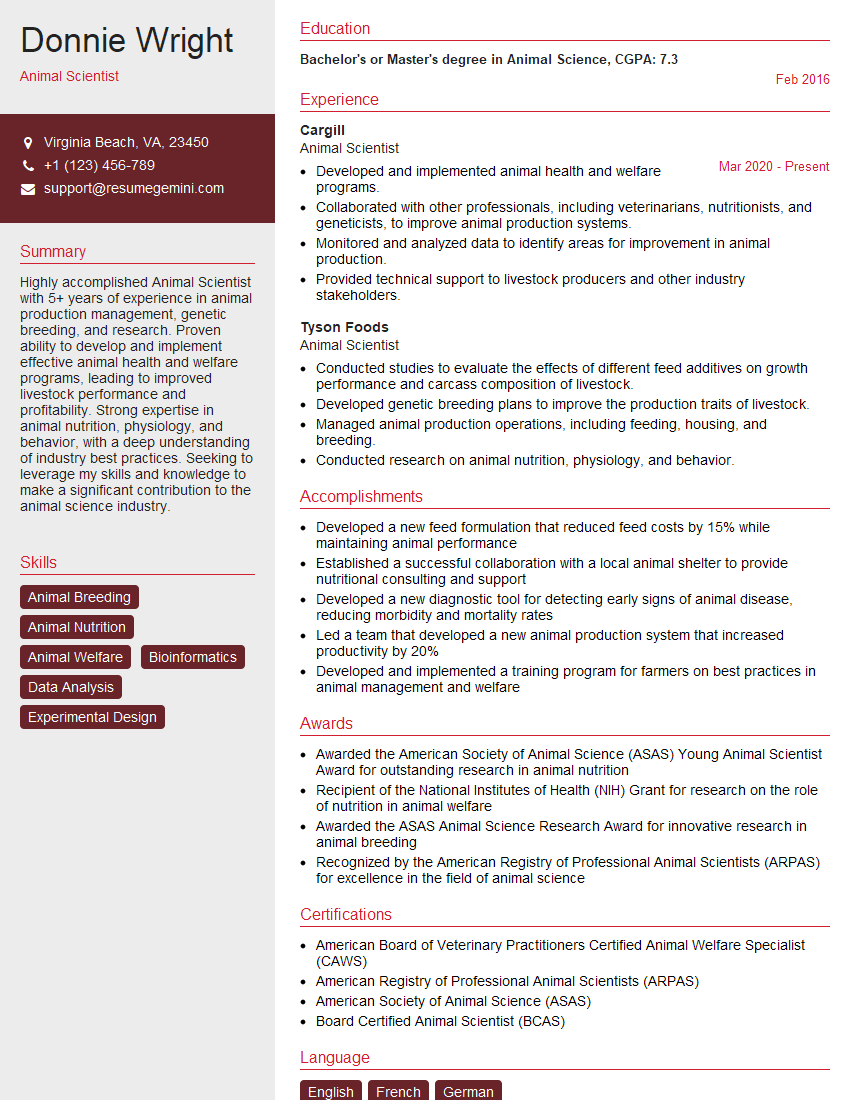Are you a seasoned Animal Scientist seeking a new career path? Discover our professionally built Animal Scientist Resume Template. This time-saving tool provides a solid foundation for your job search. Simply click “Edit Resume” to customize it with your unique experiences and achievements. Customize fonts and colors to match your personal style and increase your chances of landing your dream job. Explore more Resume Templates for additional options.

Donnie Wright
Animal Scientist
Summary
Highly accomplished Animal Scientist with 5+ years of experience in animal production management, genetic breeding, and research. Proven ability to develop and implement effective animal health and welfare programs, leading to improved livestock performance and profitability. Strong expertise in animal nutrition, physiology, and behavior, with a deep understanding of industry best practices. Seeking to leverage my skills and knowledge to make a significant contribution to the animal science industry.
Education
Bachelor’s or Master’s degree in Animal Science
February 2016
Skills
- Animal Breeding
- Animal Nutrition
- Animal Welfare
- Bioinformatics
- Data Analysis
- Experimental Design
Work Experience
Animal Scientist
- Developed and implemented animal health and welfare programs.
- Collaborated with other professionals, including veterinarians, nutritionists, and geneticists, to improve animal production systems.
- Monitored and analyzed data to identify areas for improvement in animal production.
- Provided technical support to livestock producers and other industry stakeholders.
Animal Scientist
- Conducted studies to evaluate the effects of different feed additives on growth performance and carcass composition of livestock.
- Developed genetic breeding plans to improve the production traits of livestock.
- Managed animal production operations, including feeding, housing, and breeding.
- Conducted research on animal nutrition, physiology, and behavior.
Accomplishments
- Developed a new feed formulation that reduced feed costs by 15% while maintaining animal performance
- Established a successful collaboration with a local animal shelter to provide nutritional consulting and support
- Developed a new diagnostic tool for detecting early signs of animal disease, reducing morbidity and mortality rates
- Led a team that developed a new animal production system that increased productivity by 20%
- Developed and implemented a training program for farmers on best practices in animal management and welfare
Awards
- Awarded the American Society of Animal Science (ASAS) Young Animal Scientist Award for outstanding research in animal nutrition
- Recipient of the National Institutes of Health (NIH) Grant for research on the role of nutrition in animal welfare
- Awarded the ASAS Animal Science Research Award for innovative research in animal breeding
- Recognized by the American Registry of Professional Animal Scientists (ARPAS) for excellence in the field of animal science
Certificates
- American Board of Veterinary Practitioners Certified Animal Welfare Specialist (CAWS)
- American Registry of Professional Animal Scientists (ARPAS)
- American Society of Animal Science (ASAS)
- Board Certified Animal Scientist (BCAS)
Career Expert Tips:
- Select the ideal resume template to showcase your professional experience effectively.
- Master the art of resume writing to highlight your unique qualifications and achievements.
- Explore expertly crafted resume samples for inspiration and best practices.
- Build your best resume for free this new year with ResumeGemini. Enjoy exclusive discounts on ATS optimized resume templates.
How To Write Resume For Animal Scientist
Quantify your accomplishments:
Use specific numbers and metrics to demonstrate the impact of your work.Highlight your skills and expertise:
Emphasize your proficiency in animal breeding, nutrition, welfare, bioinformatics, data analysis, and experimental design.Showcase your passion for animal science:
Convey your enthusiasm for the field and your commitment to improving animal health and welfare.Proofread carefully:
Ensure your resume is free of any errors in grammar, spelling, or formatting.
Essential Experience Highlights for a Strong Animal Scientist Resume
- Conducted studies to evaluate the effects of different feed additives on growth performance and carcass composition of livestock.
- Developed genetic breeding plans to improve the production traits of livestock.
- Managed animal production operations, including feeding, housing, and breeding.
- Conducted research on animal nutrition, physiology, and behavior.
- Developed and implemented animal health and welfare programs.
- Collaborated with other professionals, including veterinarians, nutritionists, and geneticists, to improve animal production systems.
Frequently Asked Questions (FAQ’s) For Animal Scientist
What is the role of an Animal Scientist?
Animal Scientists are responsible for the care and management of animals, including livestock, pets, and wildlife. They conduct research on animal nutrition, physiology, and behavior to improve animal health and welfare. They also develop and implement breeding programs to improve the production traits of livestock.
What are the educational requirements for an Animal Scientist?
Most Animal Scientists have a bachelor’s or master’s degree in Animal Science or a related field. Some Animal Scientists also have a doctorate in Animal Science or a related field.
What are the career prospects for Animal Scientists?
Animal Scientists can work in a variety of settings, including academia, government, and industry. They can work as researchers, educators, extension agents, or animal production managers.
What are the key skills and qualities of a successful Animal Scientist?
Successful Animal Scientists have a strong understanding of animal nutrition, physiology, and behavior. They are also skilled in data analysis, experimental design, and communication. They are passionate about animal welfare and have a strong work ethic.
What are the challenges facing Animal Scientists?
Animal Scientists face a number of challenges, including the need to improve animal health and welfare, increase food production, and protect the environment. They also face challenges related to climate change, emerging diseases, and antibiotic resistance.
What are the rewards of being an Animal Scientist?
Animal Scientists can make a real difference in the lives of animals and humans. They can help to improve animal health and welfare, increase food production, and protect the environment. They can also help to educate the public about the importance of animals.